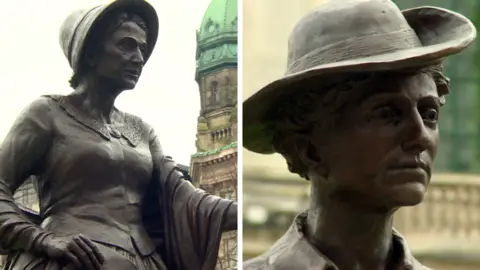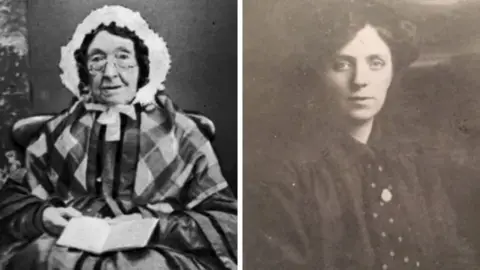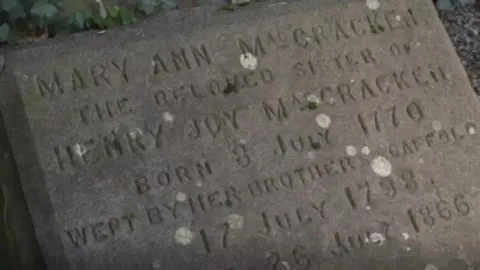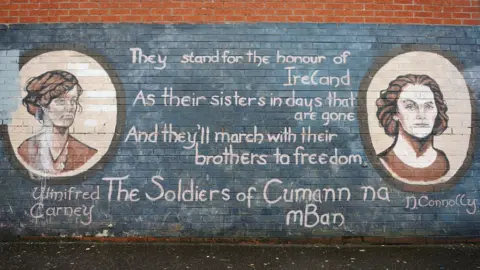Anti-slavery campaigner and trade unionist honoured
 BBC
BBCStatues of two historic women activists have been unveiled at Belfast City Hall to mark International Women's Day.
Anti-slavery campaigner Mary Ann McCracken as well as suffragist and trade unionist Winifred Carney have been honoured with bronze statues.
They are the first non-royal women to get statues in the grounds of Belfast City Hall.
A celebratory event took place on Friday evening to celebrate both women's legacy.
It featured music, poetry, performances and a panel discussion.
 National Museums Northern Ireland/BBC
National Museums Northern Ireland/BBCPlans for both statues had been agreed back in 2021.
They were the first memorial figures installed on the grounds of city hall since 2013.
Friday's unveiling was attended by Belfast's Lord Mayor councillor Ryan Murphy and sculptors Ralf and Naomi Sander.
They were joined by Gerry Murphy from the Irish Congress of Trade Unions and special guests from Kabosh Theatre Company dressed in character as Mary Ann and Winifred.
Who was Mary-Ann McCracken?
Mary Ann McCracken was born into a middle-class Presbyterian family in 1770 and was one of seven children.
Her father was a sea captain and her grandfather set up the News Letter, the world's oldest English-language daily newspaper.
She went to school with boys and girls - which was unusual at the time - and was heavily involved in the Belfast Charitable Society and Poor House which her family helped to set up.
She was a supporter of the United Irishmen, a group that was co-founded by her brother Henry Joy McCracken. He was later executed in 1798 for his role in the failed rebellion.

She campaigned all her life to end slavery as an active member of the Belfast Ladies Anti-Slavery Association, even refusing to eat sugar as it was a product of the slave trade and West Indies plantations.
Up until her late 80s, she could be found in Belfast’s docks where she warned emigrants bound for the United States about slavery.
She died in July 1866 at the age of 96, but her grave remained unmarked until 1909 when her name and the inscription Díleas go h-éag, or Faithful Until Death, was added.
More information on Mary Ann McCracken can be found here.
Who was Winifred Carney?
Winifred Carney was born into a lower-middle class family in Bangor, County Down in 1887 to a Catholic mother and Protestant father.
However, she moved to Belfast with her mother and six siblings after her parents divorced, while her father moved to London.
She became involved in political activism early in her adult life through suffragist and socialist activities.
Carney was at James Connolly's side throughout the Easter Rising - she was his close confidant and typed his orders throughout the rebellion.
She was one of the founding members of Cumann na mBan (League of Women), which was an Irish republican women's paramilitary organisation.
 Frédéric Soltan/Corbis/Getty Images
Frédéric Soltan/Corbis/Getty ImagesIn 1918, Carney stood as a Sinn Féin candidate in the general election, and was the only female candidate apart from Constance Markievicz.
However, disillusioned with the party, she joined the Northern Ireland Labour Party in 1924.
As an active trade unionist she sought support from both sides of the sectarian divide in Northern Ireland.
In 1928 she married George McBride, a Protestant Orangeman and fellow trade union activist.
Carney died in November 1943 at the age of 55 and is buried in west Belfast's Milltown cemetery.
More information on Winifred Carney can be found here.
